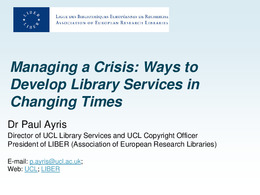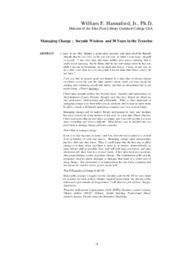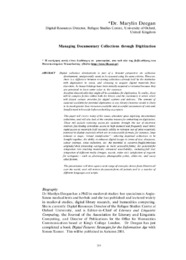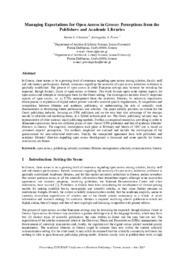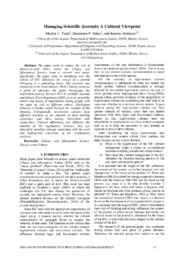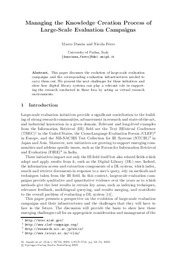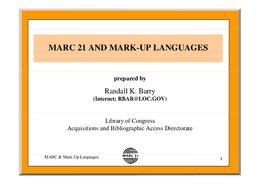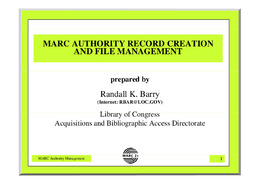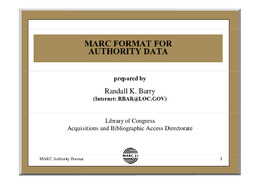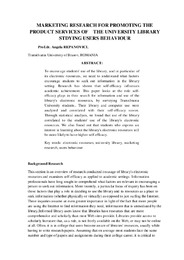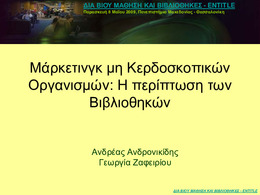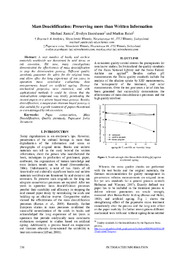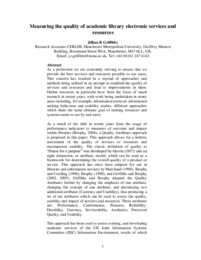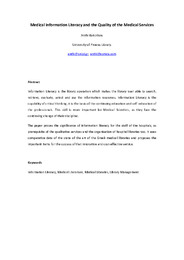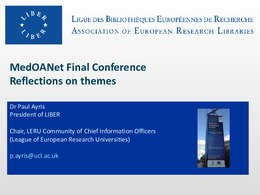Browsing Παρουσιάσεις και ομιλίες σε συνέδρια, διημερίδες, ημερίδες και σεμινάρια by Title
Now showing items 394-413 of 2236
-
Maintaining object authenticity in very large digital libraries
(2009)Digital libraries are increasingly being used to manage re- search data, leading to a signi¯cant increase in the amount of material held in such systems. Much of this material is irreplaceable, and there is a pressing need ... -
Managing a Crisis: ways to Develop Library Services in Changing Times
(Πανεπιστήμιο Μακεδονίας, 2011) -
Managing change: Socratic Wisdom and 30 years in the Trenches
(Πανεπιστήμιο Μακεδονίας, 2001)I came to see that, though a great many persons, and most of all he himself, thought that he was wise, yet he was not wise, so when I went away, thought to myself, "I am wiser than this man: neither of us knows anything ... -
Managing documentary collections through digitization
(Πανεπιστήμιο Μακεδονίας, 2001)Digital collection development is part of a broader perspective on collection development, and generally needs to be assessed using the same criteria. However, there is a difference between reviewing collections already ... -
Managing Expectations for Open Access in Greece: perceptions from the Publishers and Academic Libraries
(2007)In Greece, there seems to be a growing level of awareness regarding open access among scholars, faculty staff and information professionals. Indeed, consensus regarding the necessity of open access initiatives in Greece ... -
Managing Scientific Journals: a Cultural Viewpoint
(2011)The paper seeks to explore the role of Editors-in-chief (EiC) within the Library and Information Science, from a cultural view point. Specifically, the paper aims at identifying how the culture of EiC influences the course ... -
Managing the Knowledge Creation Process of Large-Scale Evaluation Campaigns
(2009)This paper discusses the evolution of large-scale evaluation campaigns and the corresponding evaluation infrastructures needed to carry them out. We present the next challenges for these initiatives and show how digital ... -
Mapping Encoded Archival Description to CIDOC CRM.
(2011)In this paper we analyze the semantics of the archival description, expressed through the Encoded Archival Description. Through this analysis it is concluded that an EAD document is a hierarchy of documentation elements ... -
Mapping the Hierarchy of EAD to VRA Core 4.0 Through CIDOC CRM
(2016)Metadata interoperability requires the development of mappings and crosswalks between different schemas. Crosswalks development is a laborious and complex task especially when metadata of compound objects include hierarchical ... -
Mapping VRA Core 4.0 to the CIDOC CRM ontology
(2011)In this paper, we present an e ffort to semantically map VRA Core 4.0, a cultural heritage metadata schema describing visual resources, to CIDOC CRM. This work is based on a semantic integration scenario, where CIDOC CRM ... -
MARC 21 and MARK-UP languages
(Βιβλιοθήκη και Κέντρο Πληροφόρησης Πανεπιστημίου Μακεδονίας, 2006) -
MARC authority record creation and file management
(Βιβλιοθήκη και Κέντρο Πληροφόρησης Πανεπιστημίου Μακεδονίας, 2006) -
MARC format for authority data
(Βιβλιοθήκη και Κέντρο Πληροφόρησης Πανεπιστημίου Μακεδονίας, 2006) -
Marketing research for promoting the products and services of the university library. Case study at Transylvania University Library of Rasov
(Πανεπιστήμιο Ιωαννίνων, 2008)To encourage students' use of the library, and in particular of its electronic resources, we need to understand what factors encourage students to seek out information in the library setting. Research has shown that ... -
Marketing Μη Κερδοσκοπικών Οργανισμών: η περίπτωση των βιβλιοθηκών
(Δημόσια Κεντρική Βιβλιοθήκη Βέροιας, 2009) -
Mass Deacidification: preserving more than Written Information
(2011)A vast number of books and archive materials worldwide are threatened by acid decay or ink corrosion. Till now, many investigations demonstrated the effectiveness of mass deacidification to stop the deterioration process. ... -
Matching Multi-lingual Subject Vocabularies
(2009)Most libraries and other cultural heritage institutions use controlled knowledge organisation systems, such as thesauri, to describe their collections. Unfortunately, as most of these institutions use different such systems, ... -
Measuring the quality of academic library electronic services and resources
(Πανεπιστήμιο Ιωαννίνων, 2008)As a profession we are constantly striving to ensure that we provide the best services and resources possible to our users. This concern has resulted in a myriad of approaches and methods being utilised in an attempt to ... -
Medical Information Literacy and the Quality of the Medical Services
(2007)Information Literacy is the library operation which makes the library user able to search, retrieve, evaluate, select and use the information resources. Information Literacy is the capability of critical thinking; it is ...

